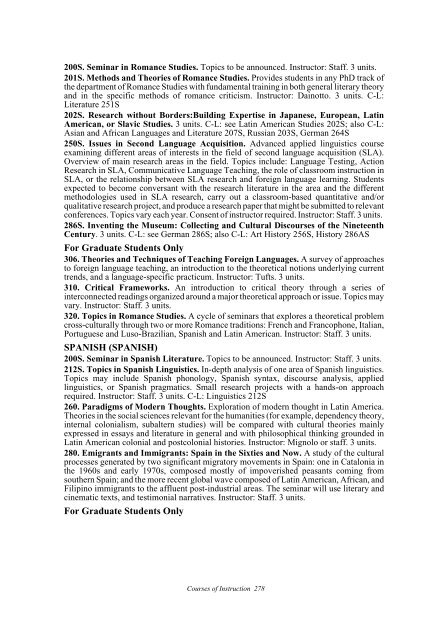Duke University 2008-2009 - Office of the Registrar - Duke University
Duke University 2008-2009 - Office of the Registrar - Duke University
Duke University 2008-2009 - Office of the Registrar - Duke University
You also want an ePaper? Increase the reach of your titles
YUMPU automatically turns print PDFs into web optimized ePapers that Google loves.
200S. Seminar in Romance Studies. Topics to be announced. Instructor: Staff. 3 units.<br />
201S. Methods and Theories <strong>of</strong> Romance Studies. Provides students in any PhD track <strong>of</strong><br />
<strong>the</strong> department <strong>of</strong> Romance Studies with fundamental training in both general literary <strong>the</strong>ory<br />
and in <strong>the</strong> specific methods <strong>of</strong> romance criticism. Instructor: Dainotto. 3 units. C-L:<br />
Literature 251S<br />
202S. Research without Borders:Building Expertise in Japanese, European, Latin<br />
American, or Slavic Studies. 3 units. C-L: see Latin American Studies 202S; also C-L:<br />
Asian and African Languages and Literature 207S, Russian 203S, German 264S<br />
250S. Issues in Second Language Acquisition. Advanced applied linguistics course<br />
examining different areas <strong>of</strong> interests in <strong>the</strong> field <strong>of</strong> second language acquisition (SLA).<br />
Overview <strong>of</strong> main research areas in <strong>the</strong> field. Topics include: Language Testing, Action<br />
Research in SLA, Communicative Language Teaching, <strong>the</strong> role <strong>of</strong> classroom instruction in<br />
SLA, or <strong>the</strong> relationship between SLA research and foreign language learning. Students<br />
expected to become conversant with <strong>the</strong> research literature in <strong>the</strong> area and <strong>the</strong> different<br />
methodologies used in SLA research, carry out a classroom-based quantitative and/or<br />
qualitative research project, and produce a research paper that might be submitted to relevant<br />
conferences. Topics vary each year. Consent <strong>of</strong> instructor required. Instructor: Staff. 3 units.<br />
286S. Inventing <strong>the</strong> Museum: Collecting and Cultural Discourses <strong>of</strong> <strong>the</strong> Nineteenth<br />
Century. 3 units. C-L: see German 286S; also C-L: Art History 256S, History 286AS<br />
For Graduate Students Only<br />
306. Theories and Techniques <strong>of</strong> Teaching Foreign Languages. A survey <strong>of</strong> approaches<br />
to foreign language teaching, an introduction to <strong>the</strong> <strong>the</strong>oretical notions underlying current<br />
trends, and a language-specific practicum. Instructor: Tufts. 3 units.<br />
310. Critical Frameworks. An introduction to critical <strong>the</strong>ory through a series <strong>of</strong><br />
interconnected readings organized around a major <strong>the</strong>oretical approach or issue. Topics may<br />
vary. Instructor: Staff. 3 units.<br />
320. Topics in Romance Studies. A cycle <strong>of</strong> seminars that explores a <strong>the</strong>oretical problem<br />
cross-culturally through two or more Romance traditions: French and Francophone, Italian,<br />
Portuguese and Luso-Brazilian, Spanish and Latin American. Instructor: Staff. 3 units.<br />
SPANISH (SPANISH)<br />
200S. Seminar in Spanish Literature. Topics to be announced. Instructor: Staff. 3 units.<br />
212S. Topics in Spanish Linguistics. In-depth analysis <strong>of</strong> one area <strong>of</strong> Spanish linguistics.<br />
Topics may include Spanish phonology, Spanish syntax, discourse analysis, applied<br />
linguistics, or Spanish pragmatics. Small research projects with a hands-on approach<br />
required. Instructor: Staff. 3 units. C-L: Linguistics 212S<br />
260. Paradigms <strong>of</strong> Modern Thoughts. Exploration <strong>of</strong> modern thought in Latin America.<br />
Theories in <strong>the</strong> social sciences relevant for <strong>the</strong> humanities (for example, dependency <strong>the</strong>ory,<br />
internal colonialism, subaltern studies) will be compared with cultural <strong>the</strong>ories mainly<br />
expressed in essays and literature in general and with philosophical thinking grounded in<br />
Latin American colonial and postcolonial histories. Instructor: Mignolo or staff. 3 units.<br />
280. Emigrants and Immigrants: Spain in <strong>the</strong> Sixties and Now. A study <strong>of</strong> <strong>the</strong> cultural<br />
processes generated by two significant migratory movements in Spain: one in Catalonia in<br />
<strong>the</strong> 1960s and early 1970s, composed mostly <strong>of</strong> impoverished peasants coming from<br />
sou<strong>the</strong>rn Spain; and <strong>the</strong> more recent global wave composed <strong>of</strong> Latin American, African, and<br />
Filipino immigrants to <strong>the</strong> affluent post-industrial areas. The seminar will use literary and<br />
cinematic texts, and testimonial narratives. Instructor: Staff. 3 units.<br />
For Graduate Students Only<br />
Courses <strong>of</strong> Instruction 278









